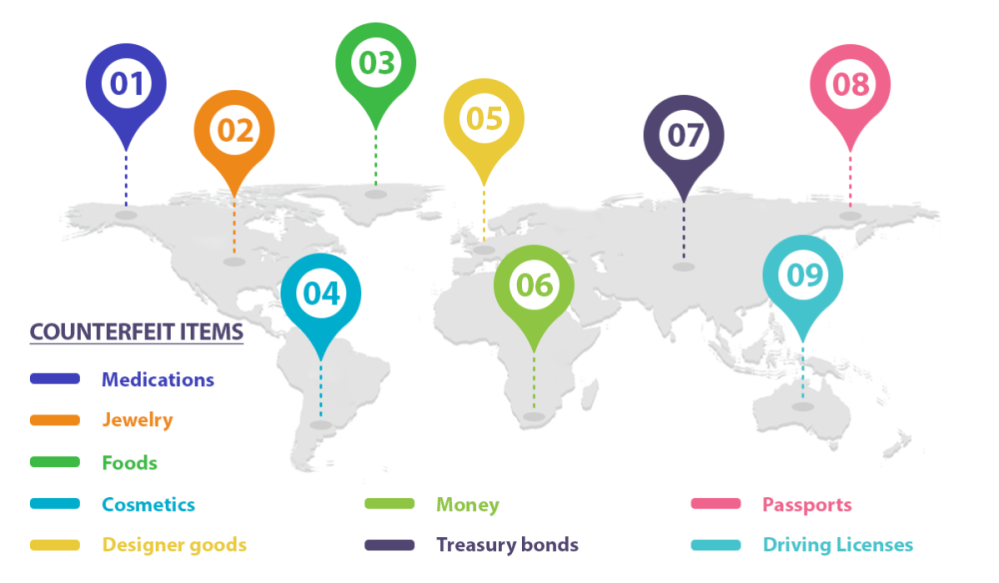What is Counterfeiting?
Theft of a intellectual property is at the heart of counterfeiting, a illegal offense. Trademarks, for example, are used by businesses of all sizes to help you recognize their products. There are many different types of trademarks that may be used to identify the source or origin of a specific product or service.
Counterfeit goods are those that use another company’s intellectual property without the owner of that brand giving their consent. Counterfeiters try to take advantage of the good name and goodwill associated with a company’s intellectual property by creating or selling a knockoff.
Counterfeiting is a illegal offense because it involves the false imitation of a well-known brand or product.
The reputation of a corporation and the trust of its customers in the global market are both harmed by counterfeiting.
How Does Counterfeiting Affect a Brand?
Consumer trust in legitimate items promoted and sold under a brand’s name is lowered as a result of counterfeiting. If someone inadvertently purchases a counterfeit product believing it to be the authentic product and the product turns out to be defective, they will hold the brand liable.
The use of internet marketplaces is one of the most common methods of detecting suspected intellectual property infringements. If left unchecked, it has the potential to hurt your brand in a variety of ways.
Commonly Counterfeit Items
Counterfeiting is often classified as a white collar crime as it is typically these individuals that have access to copyrighted, trademarked, or other protected information or products that can then be counterfeited. Some commonly counterfeit items include:
Where Do Counterfeits Originate?
While counterfeit products are sold around the globe, the production of fake goods is most prevalent in developing countries with strong, but low-cost, manufacturing capabilities, including a number of jurisdictions in Asia, Eastern Europe, and Latin America.
Where are Counterfeits Sold?
The Internet has made it even easier for counterfeiters to sell counterfeit goods anonymously to avoid getting caught. Online sellers of fake goods advertise discounted products by using images of the authentic goods, often taken directly from a brand owner’s website, in order to entice consumers to buy the product. Using images of the actual product deceives consumers into believing the product sold online at a discounted price is the real thing.
Trademark and Copyright Infringement
Trademarks and copyrights are used to protect the creators and owners of original content against copying. A trademark is used to distinguish services, products, companies, and the source that will be associated with the product or service. When a trademark is infringed, it is likely to create confusion in products for the consumer. Trademarks may include brand names, logos, symbols, words, colors, and product configurations. Under common law, trademarks are protected even if they are not registered as long as they meet certain qualifications. However, trademarks are typically registered in the USPTO as federally registered trademarks, but they can also be registered in states.
On the other hand, copyrights are used to protect subject matter work. Copyrights protect the expression of ideas, which can be violated not only by unauthorized duplication but also by derivative works. For example, building designs, books, poetry, music, and other works can be copyrighted.
Why Do You Need a Trademark or Copyright Infringement Lawyer?
It is crucial that you hire an attorney if you have been accused of violating copyright or trademark laws. An attorney will personalize your case and provide solution-oriented legal guidance. Once an attorney has a firm understanding of your objectives, they can create an effective strategy to help you achieve your goals and overcome your legal battles. Copyright or trademark attorneys will work with you to move forward in negotiating or mediating with those who have accused you of unauthorized duplication of work.
Defenses for Copyright or Trademark Infringement
Fortunately, there are a few common defenses that we can likely use to help stop this charge against you. They are:
Fair Use: This is the most common defense for copyright or trademark infringement. You may use copyrighted material or trademarks without permission as long as the use is “fair,” such as in parody, advertising non-competitor products, or description.
Unreasonable Delay: If you have been using the copyrighted material or trademark for a long period of time, it may be too late for someone to bring an infringement claim against you. Copyrights and trademarks have to be protected, so when they fail to do so, they may lose their copyright or trademark altogether.
Unclean Hands: If the plaintiff acted egregiously when bringing the claim against you, the need to punish the plaintiff may outweigh the need to stop your infringement.
Need Help?
Contact us at the consulting office or feel free to submit a business inquiry online.

